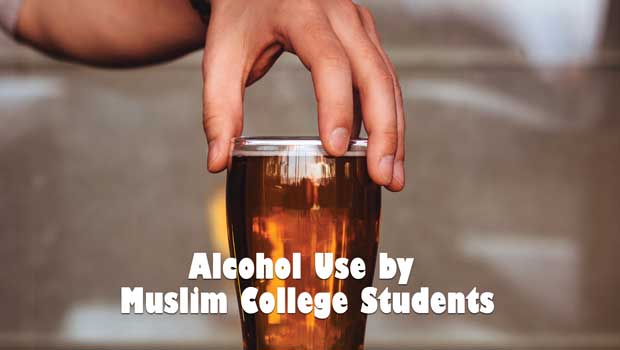“There’s nothing else happening on this campus anyway,” Amir thought to himself as he grabbed his jacket and rushed off to join his classmates at the neighborhood sports bar. It had become too difficult to resist the pressure to join his friends in watching the game on Friday night. He never imagined it would soon become too difficult to resist the temptation to join in on the drinking as well.
The drinking culture at American colleges and universities has become a ritual that students often see as an integral part of their higher education experience. However, it may be surprising to learn that many students come to college with established drinking habits, and the college environment can just exacerbate the problem. According to the 2014 National Survey on Drug Use and Health, almost 60 percent of college students, ages 18 to 22, drank alcohol in the previous month, and almost 2 out of 3 of them engaged in binge drinking (typically 4 drinks for women and 5 drinks for men—in about 2 hours) during that same timeframe.
Research shows that students who choose not to drink often do so because their parents discussed alcohol use and its adverse consequences with them.
Many of us think that these issues don’t apply to the Muslim community – but they do. Young Muslims are constantly dealing with the tension between demands placed on them by society and religious and family expectations. With such a ritualized importance placed on alcohol use in college, and the strong prevalence of drinking among students, it becomes a challenge that Muslim college kids inevitably will face. It is important to know how Muslims deal with this pressure in order to inform prevention, early intervention, and treatment.
How Big a Problem is College Drinking?
College drinking is a significant problem within the general population. Drinking impacts the intellectual and social lives of students on campuses across the United States. About 1 in 4 college students report academic consequences from drinking, including missing class, falling behind, doing poorly on exams or papers, and receiving lower grades overall. Researchers estimate that each year, about 1,825 college students die from alcohol-related accidental injuries, including motor-vehicle crashes; roughly 696,000 students are assaulted by another student who has been drinking; and about 97,000 students report experiencing alcohol-related sexual assault or date rape.
Although the majority of students go away to college already having had some experience with alcohol, the college environment does contribute to increased drinking. For example, the widespread availability of alcohol, inconsistent enforcement of underage drinking laws, unstructured time, and limited interactions with parents and other adults, can intensify the problem.
What About the Muslim Students?
Very little is known specifically about alcohol use by Muslim college students in the U.S. or other countries. The most recent study that touches on alcohol use by Muslim college students in the United States was conducted by The Family & Youth Institute with data that was collected in May of 2001 (in the Harvard School of Public Health College Alcohol Study). As reported in an article, “Alcohol Use Among U.S. Muslim College Students: Risk and Protective Factors,” in the Journal of Ethnicity in Substance Abuse, of the 10,401 students at 119 colleges surveyed, 135 (1.3 percent) reported they were raised in Muslim families. These students reported that alcohol was easily accessible (60 percent). Approximately 47 percent of these Muslim students reported that they had drunk alcohol during the previous year, compared to 80.7 percent of all non-Muslim students. Interestingly, there was no difference in alcohol use between Muslim males and females surveyed. Of the Muslims who drank, most (76.7 percent) began drinking before they started college. This means many young people began drinking while they were still living at home, highlighting the need for parents and communities to work together towards prevention. In addition, these students were also more likely to smoke cigarettes and use marijuana and other illegal drugs. While many of these students said that Islam was important to them, if they chose to drink alcohol, religion was no longer a protective factor for them against other prohibited behaviors. (consider insert image: http://www.thefyi.org/fyi-infographics/american-muslim-youth-risk-behaviors/ )
When compared to students of other religious backgrounds, Muslim students had the lowest alcohol use. However, 47 percent is higher than what one would expect given that Islam prohibits alcohol. So why are Muslim students drinking alcohol? (consider insert image: http://www.thefyi.org/fyi-infographics/alcohol-use-among-muslim-college-students/ )Muslim students who drank pointed to social reasons as their most important reason for drinking. Other reasons included curiosity and peer pressure. For those Muslim students who chose not to consume alcohol, their reasons for not drinking was because their parents would disapprove and because they said spending time involved in religious activities was important to them.
What can we do?
Parents have the greatest influence on preventing alcohol use. Research shows that students who choose not to drink often do so because their parents discussed alcohol use and its adverse consequences with them. Since more than 70 percent of the alcohol use among the Muslim students was initiated prior to entering college, while still living at home, prevention must begin in middle and high school. Honest and open communication between parents and children is so important, and communication specifically about alcohol and drug use, starting in their young teens and continuing throughout college, must be a priority. Many of the students who reported drinking alcohol in college also had parents who drank alcohol at home and in social environments. Thus, prevention efforts must also be directed towards the adult population of the community, as well as counseling to strengthen marriages and mental health counseling to decrease the progression of self-destructive behaviors. These efforts must address the entire family and should include anti-drug and anti-tobacco messages as well.
Communities must work hard to develop youth-centered religious programming and inclusive religious centers that meet the needs of the diverse American Muslim community. This will encourage the youth to be more active in their religious community and allow them to consider spending more time on religious activities, which, as we have seen, is an important factor in protecting youth from alcohol and drug use. Muslim Student Associations at colleges should also be welcoming and inclusive to male and female students of all ethnic backgrounds to provide them with a safe social environment. In addition to religious activities, they must also provide a space for halal entertainment and nonjudgmental companionship. For additional ideas, see State of American Muslim Youth: Research & Recommendations, a report published by The Family & Youth Institute and the Institute for Social Policy and Understanding.
Interestingly, although almost half of the Muslims surveyed in 2001 admitted to drinking alcohol in the previous year, none of them reported seeking any help or treatment for alcohol problems. There is a stigma associated with alcohol use among Muslims that also prevents those who need help from seeking out treatment. Confidential support centers and counselors must be made readily accessible to Muslim students seeking help.
In addition, as a community, we must support organizations like The Family & Youth Institute and others who are conducting research in these critical areas. More recent data on alcohol use among Muslim college students is critically needed. This is especially the case since the current data may be very different given the increasing rate of anti-Muslim sentiment and the constant Islamophobic rhetoric that streams across social and mass media outlets. Some youth may be avoiding alcohol as part of a renewed commitment to their religious values; however, others may drink to cope with their stressors or to fit in with their peers. In order to devise appropriate counter efforts and develop protective factors, more research needs to be done to know when drinking begins, what factors are associated with drinking, and if there are other factors impacting drinking patterns among Muslim youth.
College is often a time of increased independence, heightened risk-taking, and experimentation. Alcohol has long been a fundamental part of the American college environment and another of the many areas Muslim students will have to navigate during these formative years. As parents, researchers, and the greater community, we must work hard to make this journey a smoother one for Amir and other college students struggling against temptation. For more information on research that has been done on Muslim youth and families, and parenting tips and resources, please visit The Family and Youth Institute’s website at www.thefyi.org






